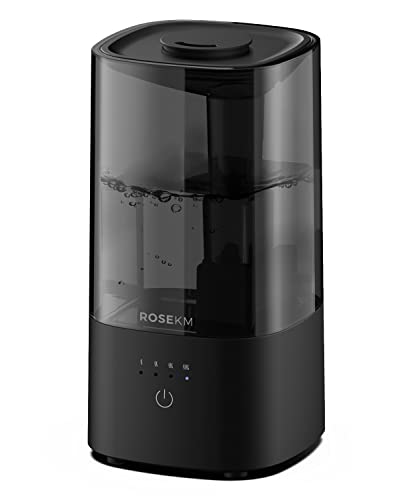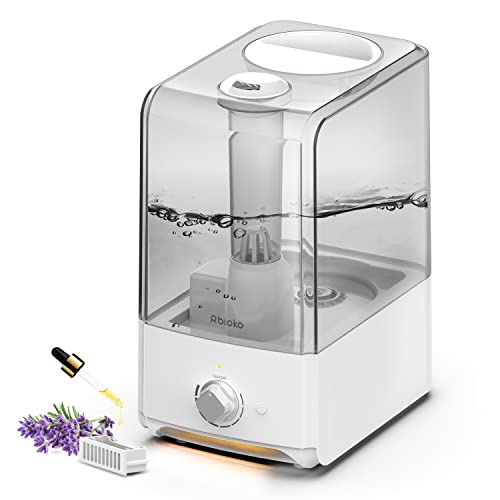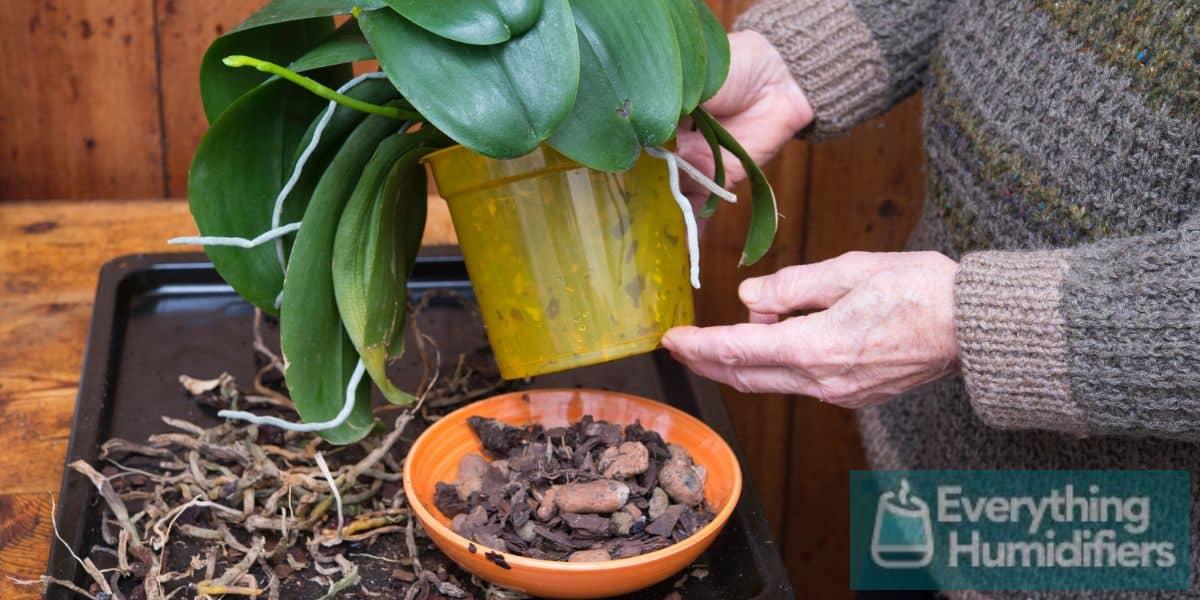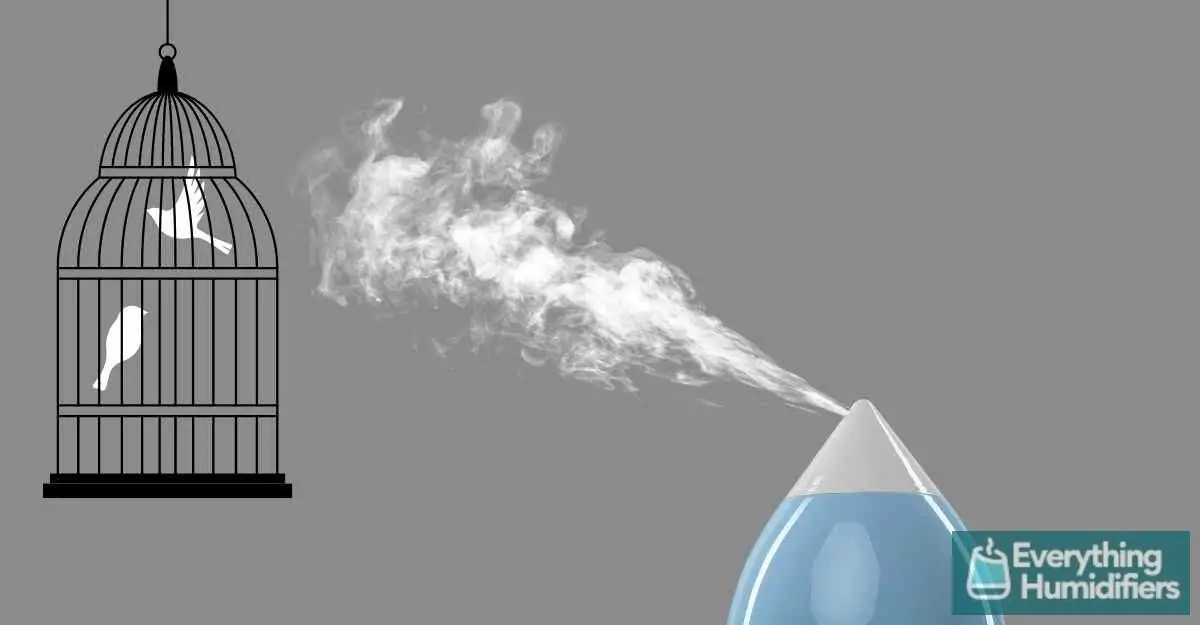Hard cheeses like Cheddar, Swiss, and Parmesan are a staple in our household. If we run out of cheese, it’s a family catastrophe.
With the price of cheese increasing and the lack of supply due to continuing impacts of Covid shortages. I have been researching more about cheesemaking and was surprised to find out that humidity plays a significant part in this craft.
The ideal humidity for aging hard cheese depends on the type of cheese and the stage of the aging process. Humidity levels generally range between 70% and 95%.
Hard cheeses must be aged to develop the best possible flavor and texture. A vital part of the aging process is to control the humidity levels in your cheese fridge, cave, cellar, or curing room.
Too low humidity will cause the cheese to dry out and crack.
Humidity that is too high can attract mold causing foul odors and a sour flavor.
The cheese aging process can take several months, depending on your recipe and the type of cheese. Store your cheese in an optimum environment with the correct temperature and humidity levels.
The levels may need to change during the different stages of the process.
Ideal humidity levels for aging Hard Cheese
We can look at some specific examples below.
| Hard Cheese Type | Humidity while Aging | Temp. while Aging | Aging Time |
|---|---|---|---|
| Cheddar | Below 80% | 39 to 46°F (4 to 8°C) | 2 to 10 months |
| Swiss | 80% | around 46°F (around 8°C) | 3 months minimum |
| Parmesan | 80 to 85% | 52 to 58°F (11 to 14 °C) | at least 12 to 14 months |
| Romano | 75 to 85% | 55 to 60°F (12 to 15°C) | from a month up to a year |
| Colby | 85 to 90% | 52 to 56°F (11 to 13°C) | 4 to 6 weeks |
Cheddar Cheese
- Type – Hard
- Humidity – Below 80%
- Temperatures – Low temperatures 39°F to 46°F (4 to 8°C)
- Time for Aging – Can range from 2 to 10 months
- Cheddar can be wrapped in plastic to prevent moisture loss.
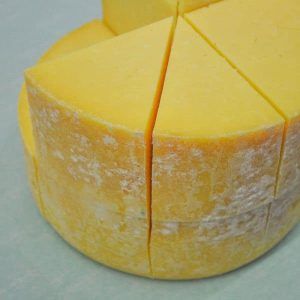
Swiss Cheese
- Type – Hard
- Humidity – 80% is ideal
- Temperatures – Around 46°F (8°C)
- Time for Aging – At least three months
- Turn the cheese several times weekly and remove any surface mold with a cloth dampened in salt water.
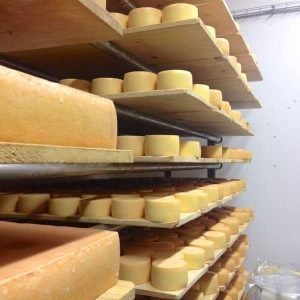
Parmesan Cheese
Type – Hard
Humidity – 80 to 85%
Temperatures – 52°F to 58°F (11 to 14 °C)
Time for Aging –12 to 14 months or longer
Brine, then dry off for a couple of days. Brush off any mold as it forms. After a couple of weeks, the rind will harden, and mold growth will lessen.
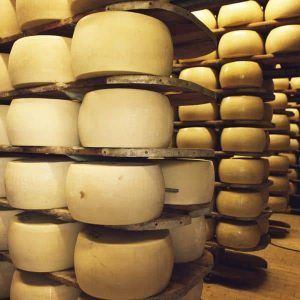
Romano Cheese
- Type – Hard
- Humidity – 75-85%
- Temperatures – Around 55 to 60°F ( 12 to 15°C )
- Time for Aging – 6 months to 2 years
- Wipe daily to remove any mold formation. Apply olive oil once the surface dries and has darkened a little. Monitor for mold and reapply oil as necessary.

Colby Cheese
- Type – Hard
- Humidity – 80 to 85%
- Temperatures – 52°F to 56°F ( 11 to 13°C )
- Time for Aging – 4 to 6 weeks
- Melt cheese wax and coat the cheese thoroughly using a waxing brush.

The majority of these statistics were gathered from New England Cheesemaking Supply Co recipes.
What happens to cheese if the humidity is too low?
Humidity that is too low can affect the aging process of hard cheese.
The cheese dries out too fast
Cheese loses moisture during aging. Dehydration needs to happen at a slow rate to allow the cheese to retain its creamy texture.
Low humidity means that there is less moisture in the air, and the cheese will lose water faster through a process called evaporation. The cheese dries out and can become hard and brittle.
Here is a simple explanation of evaporation from National Geographic.
The cheese can crack
The cheese or the casing can crack. Cracks and fissures will allow bacteria and mold to penetrate, leading to contamination and a loss of texture and flavor in less severe cases.
The flavor can change
When cheese dries out too fast, the bacteria that create the flavor become overactive—causing the flavor to become sharper, more intense, or even bitter.
What happens to cheese if the humidity is too high?
Humidity that is too high will also cause changes in the aging process of the cheese.
High humidity attracts mold
Mold will flourish on cheese stored in extra-high humidity spaces. The surface of the cheese becomes slimy, as well as alters the flavor profile negatively.
Cheese can develop bad odors
Mold colonies emit foul odors, and you don’t want this on your cheese.
Certain cheeses, like Blue Cheese, are specifically known for their pungent smell caused by mold. However, this is created in a controlled environment rather than a high-humidity space filled with unwanted mold.
The cheese becomes too soft
Hard cheese needs to be hard!
High humidity changes the texture, making it soft and mushy. The cheese may even lose its rigid shape rendering it unfit to eat or sell.
How is humidity best controlled?
Hard cheeses generally need relatively high humidity for the aging process.
At home, the best way to age cheese is in a home cheese cave, a refurbished refrigerator, a closet, a box, or a cellar.
Your home environment may naturally be suitable if you live in a region with high humidity. If not, you will have to increase your humidity to the required levels.
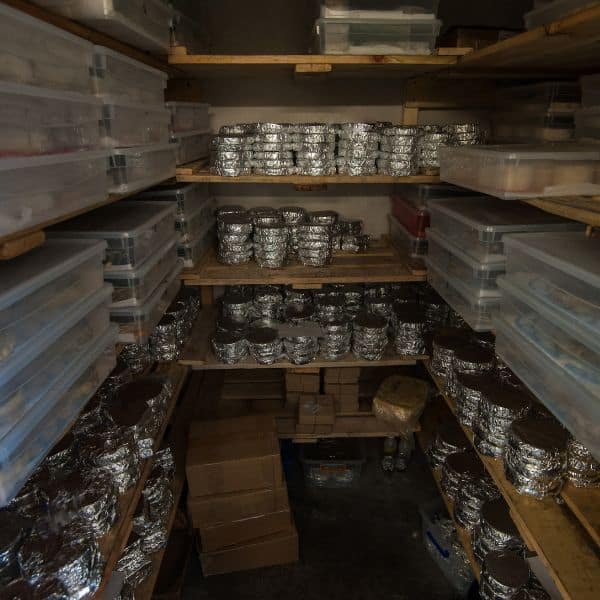
Here are a few options to do this:
- Vacuum seal the cheese in plastic.
- Line the base of the container with a damp cloth or towel. The dampness will increase the water vapor content in the container.
- Place a small container of water in the storage compartment. As the water evaporates, the humidity will increase.
- Coat the cheese with food-grade cheese wax. Which helps prevent loss of moisture.
- Use a misting spray. This manual process could become tedious as cheese needs many months to age. Or cathartic if you have time to dedicate to your cheese.
- Seal any air leaks in your storage container or space. Leaks make it challenging to maintain constant humidity and temperature levels.
- Install a humidifier. A humidifier will ensure that humidity levels remain constant during the aging process. Having the correct humidity is vital.
- Measure your humidity using a hygrometer.
What other factors affect aging hard cheese?
We now know all about humidity – but there are other considerations. The process of aging cheese requires attention to the following –
Temperature
Temperatures can range between 40°F to 80°F and vary throughout the process depending on the type of cheese and the cheesemaking stage.
Ventilation
While ventilation is needed from time to time to refresh the air, too much air movement will hinder the aging process. Adequate airflow is achieved by simply spacing the cheese out and avoiding overcrowding.
Mold control
Many types of cheese require mold for the aging process. However, unwanted mold can damage your cheese. Inspect your cheese regularly and wipe off unwanted mold using a dry cloth or a cloth dipped in diluted vinegar.
Containers and storage surfaces
These can be plastic, glass, or even wood. In all cases, sterilize the containers before storing your cheese.
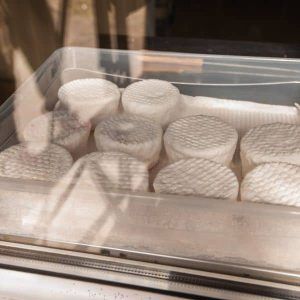
TLC – As in Tender, Loving, Care
Take care of your cheese and spend the time to ensure that they are ideally stored. Mature cheese is a celebration of tradition and craftsmanship, achieved only with patience, dedication, and the passage of time.
Note – these are general guidelines, and the specific conditions required for cheesemaking may vary depending on the recipe or method used. It’s essential to follow the instructions provided in your particular recipe to ensure the best results.
The information for this article was gathered from the below sources and may assist you with your cheesemaking journey:
- American Cheese Society is the leading organization supporting the understanding, appreciation, and promotion of artisan, farmstead, and specialty cheeses produced in the Americas.
- CheeseForum is an online community of cheesemakers who share information and tips on all aspects of cheesemaking, including controlling humidity.
- New England Cheese Making Supply Co is a comprehensive website with articles, videos, and forum discussions on humidity and cheese topics. You can learn cheesemaking as well as purchase any particular item you could need for the process.
Ideal Humidity levels for Soft Cheese
Click the below button if you would like to read about the ideal humidity levels for making Soft Cheese.





